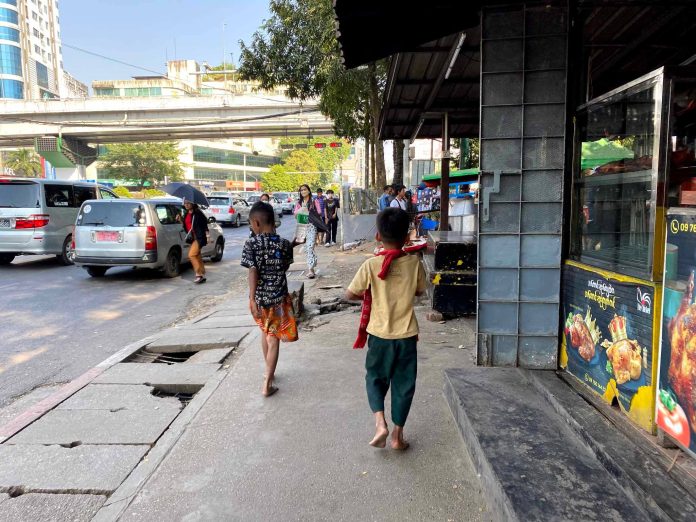Children were sound asleep when the military coup took place on Feb. 1, 2021. When they awoke, news about what happened was shared with them by their parents and relatives. Some children even joined the anti-coup protests several days later alongside their family members, becoming involved in a political movement that would define their generation, now known as Generation Z and the Spring Revolution, which is fundamentally against a return to military rule in Myanmar.
On Feb. 20, soldiers killed Maung Wai Yan Tun, 16, by a bullet to the head. He was transporting injured anti-coup protesters to ambulances using a push cart. Since then, nearly 400 children have been killed by the military. Not to mention the millions of kids who’ve fled their homes with their families due to war and violence in their communities since 1962 – when the military staged its first coup, turning its weapons against the country’s ethnic minority communities living in the borderlands. Children in Myanmar have had to deal with more than those in neighbouring countries. Many of them must leave school, if there were classes for them to attend to begin with, to work to support their families.
Due to the rapidly deteriorating economy, thanks to the COVID-19 pandemic and 2021 military coup, there were reports of children working in Yangon and other cities across Myanmar. “When the political situation worsened, we have [noticed] that some gangs force children in various ways to beg for money. It is very difficult with the current economic and political situation to carefully monitor these things,” said an anonymous child care worker in Yangon.
“I saw video clips online that show children being forced [to beg]. But I still haven’t seen it with my own eyes. As a mom, I don’t want this kind of thing to exist,” said the mother of a five-year-old on the condition of anonymity. Many school-aged children are unable to attend classes. An entire academic year was lost due to the COVID-19 lockdown. The 2021 military coup also hindered children’s education, as many parents stopped sending their kids to public school for their own safety and to support teachers who went on strike for the Civil Disobedience Movement (CDM).
Some children living in urban areas are able to attend online classes because of the decent internet connections, but children living in rural areas may lack this opportunity because of little to no internet. Government schools were ordered reopened by the military in June 2021. The National Unity Government (NUG) has established its own educational system and opened schools online – deemed illegal by the military. A list of students and teachers at the Interim Basic Education School – Thingangyun (IBEST) under the NUG Ministry of Education was leaked on a pro-military Telegram channel on Nov. 23, 2022 – forcing the school to immediately close.
Airstrikes on a monastery school in Let Yet Kone village, Tabayin Township Sept. 17, 2022, and a ceremony in Pa Zi Gyi village, Kanbalu Township on Apr. 11, 2023 killed dozens of children in Sagaing Region. “The situation of children in Myanmar is getting worse and worse, and as of 2023, 5.6 million children are in need of humanitarian assistance,” a UNICEF Myanmar representative told RFA.
Back in December 2021, residents of Lay Kay Kaw, Karen State – near the Thai-Myanmar border – fled airstrikes. Many children crossed the border into Thailand with their families to escape the violence and were forced to live as refugees. Heavenly Home school was opened in the city of Mae Sot to welcome these kids and provide education to 100 of them. “When Lay Kay Kaw was raided by the military forces, we had one school there. The school was destroyed,” said the teacher who founded Heavenly Home school in Thailand. But for the rest of Myanmar’s children, living nowhere near the sanctuary that Thailand provides, must continue to persevere despite poverty and the lack of access to education since Myanmar’s military coup upended their lives and their futures.
Visual Rebellion is a collective of journalists, photographers, filmmakers, and artists who came together in the aftermath of the 2021 Myanmar military coup. Our aim is to provide young creators with the necessary resources to keep producing factual stories about what is happening on the ground. We partner with international organizations and media outlets to fund and spread our work. We also offer diverse ways that you can support the project.



